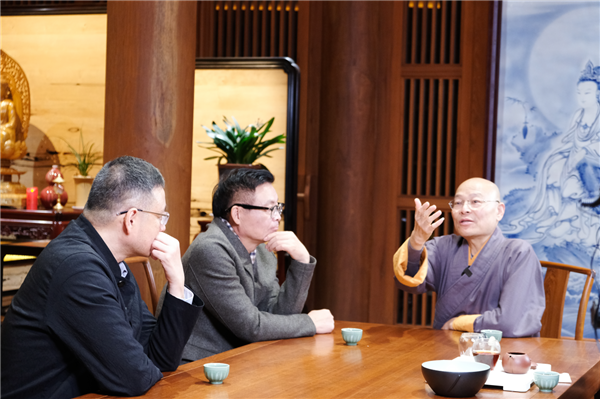
Recently, the “Lingyin Night Talks”, part of the 10th Chinese Filial Piety Culture Festival series, took place at the ancient Lingyin Temple, which has a history of over a thousand years. Renowned writer, Mao Dun Literature Prize winner, Vice Chairman of the China Writers Association, and National People’s Congress representative Mai Jia engaged in a discussion on filial piety culture with Venerable Master Guangquan, the abbot of Lingyin Temple and Deputy Secretary-General of the Buddhist Association of China. They shared insights on the beauty of cultural and artistic expressions in the process of the Sinicization of Buddhism.
During the event, Mai, drawing from his profound literary background, articulated how filial piety culture is reflected in literary works. He emphasized that filial piety is not only the core of family ethics but also an essential part of the spirit of the Chinese nation. It flows like a warm stream, nurturing the hearts of generations of Chinese people.
Mai also stressed that in our rapidly changing modern society, the inheritance and innovation of filial piety culture play an irreplaceable role in building a harmonious society and promoting goodwill among people.
Venerable Master Guangquan offered a Buddhist perspective on filial piety, asserting that it represents the truest form of kindness inherent in human nature, aligns with the spirit of benevolence in Buddhism, and exemplifies a typical characteristic of the Sinicization of Buddhism.
Additionally, he noted that filial piety is not only about showing filial respect for one’s parents but also encompasses a broader love and care for all sentient beings. “In the rich soil of Chinese culture, the culture of filial piety shines like a beacon, illuminating hearts and guiding us toward a more harmonious and beautiful world,” said Venerable Master Guangquan.
This dialogue, as an important part of the 10th Chinese Filial Piety Culture Festival, not only enriched the festival’s content but also contributed wisdom and strength to the inheritance and development of filial piety culture, allowing this Chinese traditional virtue to flourish anew in the modern era.
Lingyin Temple, an ancient temple and a national key cultural relic protection unit, boasts a rich cultural heritage. The “Lingyin Night Talks” will continue to invite cultural luminaries to engage in dialogues and exchanges at this cultural heritage site, promoting the preservation and transmission of Chinese cultural heritage.